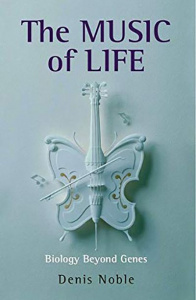The Music of Life – Biology Beyond Genes
 By Denis Noble
By Denis Noble
Review by Kate (Biomedical Sciences)
In The Music of Life, Denis Noble reassesses the traditional “gene-centred” view of biology through various, often musical metaphors. A former professor at Oxford, Noble talks about his research on evolution, the human physiome project and creating a virtual heart. He also discusses hypothetical research ideas, such as “How do we identify the “self” in the brain?” and “How can we decide if the genes control the body or if the body controls the genes?”
The book’s alternate title “Biology Beyond Genes” explains Noble’s main aim: to show that organisms are more than machines built by genes. He demonstrates that the relationship between organs, tissues, cells, organelles and genes isn’t always bottom-up and that these “higher systems” can affect gene expression. At school, we are often taught that there is a gene for x and a gene for y. Noble combats this by explaining in simple terms that multiple genes and environmental factors need to come together to produce a specific phenotype or function.
As a musician myself, the musical metaphor that runs throughout the book was a great way to understand Noble’s system-based view of biology. In the same way that sheet music doesn’t spontaneously make a sound without musicians, instruments and a conductor to play it, genes don’t produce a living organism without molecules, cells and different tissue types for them to interact with.
I first read The Music of Life after writing my personal statement and before I had my interviews at Oxford. Throughout sixth form, I’d found genetics the most interesting part of my A-Level biology course and read The Selfish Gene by Richard Dawkins and wrote about it in my personal statement. This had left me with a very gene-centred view of biology. Reading The Music of Life helped to reframe my understanding of genes as instruments to be used to create life rather than an instruction manual. In parts, Nobel quotes The Selfish Gene and rephrases it to make the argument for a more integrated view of biology. This helped me to understand the scientific debate at the heart of the book, and realise the benefits and drawbacks of an integrated vs. a reductionist view of biology.
I would highly recommend that anyone who has read The Selfish Gene read The Music of Life to gain a more well-rounded view of the importance of genetics in biology and medicine. In the process of explaining the integrative approach to biology, the book also covers a wide range of biological principles, many of which I have built upon throughout my first term of studying biomedical science.
The Music of Life – Biology Beyond Genes by Denis Noble
ISBN-10: 0199228361
ISBN-13: 978-0199228362
Try checking the availability of this book at your school or local library or explore second hand bookshops and websites. You may also wish to purchase from either Amazon or Blackwell’s.
